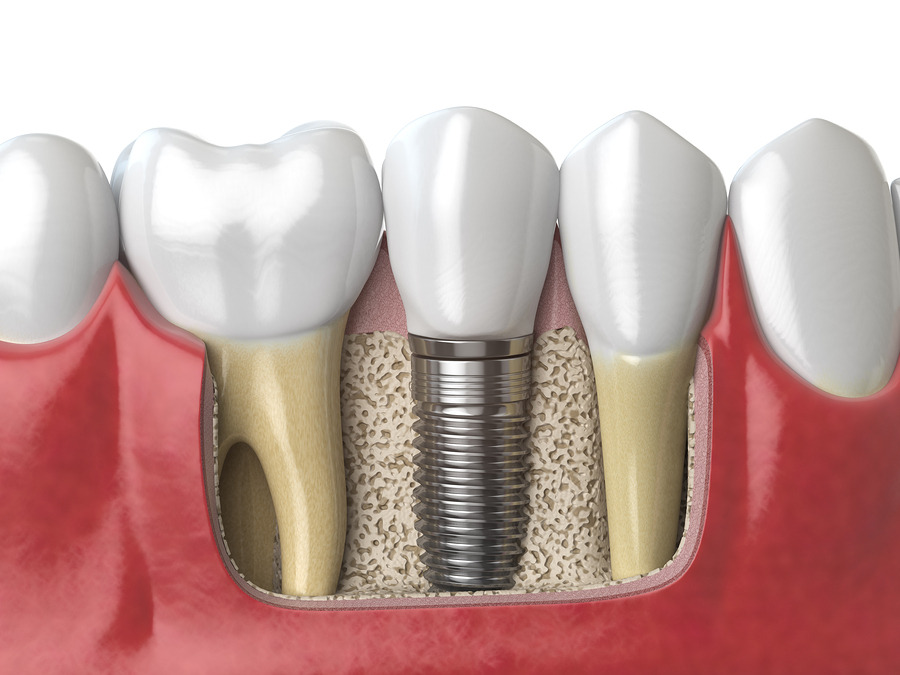Implants
What is a Dental Implant?
Dental implants are artificial screws made of titanium or zirconium oxide. It is designed to connect the jawbone to an implant restoration such as a crown or denture. Also known as ‘endosseous’ implants or fixtures, these serve as artificial tooth roots. Once implanted, the dental implant integrates with the surrounding bone, becoming part of the body.
For patients lacking sufficient bone structure, dental surgeons may perform bone grafting procedures to secure the implant. In cases involving the upper jaw, grafting may also connect implants to the maxillary sinuses on either side of the nose.

How Long Does it Take to Fit a Dental Implant?
The duration of a dental implant procedure varies based on the patient’s bone structure and specific needs. Some procedures take about 15 minutes, while others may require up to two hours. These procedures are usually performed under local anesthesia, with intravenous sedation available for anxious patients.
How Long is the Recovery After Getting a Dental Implant?
Recovery time after a dental implant procedure typically ranges from four to six weeks, but can extend up to 12 weeks for some patients. After a single dental implant, patients can generally travel the next day. However, those requiring multiple implants or additional surgical procedures should wait two weeks before traveling. It is advisable to obtain a doctor’s certificate confirming fitness to travel.
Post-Procedure Care for Dental Implants
After receiving a dental implant, patients should rest and avoid strenuous activities. They should also refrain from vigorous brushing or rinsing their mouth immediately after surgery.
Alternatives to Dental Implants
Alternatives to dental implants include fixed bridges and dentures, which can also restore functionality and appearance to missing teeth.
Dental Implants & Root Canal FAQs
Frequently Asked Questions
How do I know if I am suitable for dental implants?
Most generally healthy people are suitable for dental implants. We carry out a strict series of examinations and checks to make sure implants are right for you.
How long will my treatment take?
The procedure to place your implant will only take one or two hours, but a temporary crown will be fitted until the bone and implant fuse together. This can take between three to nine months, as every patient heals differently.
If you’re having an extraction, in many cases, we may be able to place your implant in the same appointment.
Will the procedure hurt?
This is one of the most commonly asked dental implant questions we hear. But don’t worry, we’ll use a local anaesthetic when placing your implants so you won’t feel any pain.
Although the procedure may be invasive, we carry out your surgery with care; gently, cautiously and precisely. Our team are highly skilled and have extensive experience in dental implant treatments.
How long will my implants last?
Once your bone and the tissue around your implant have healed (after about 3-6 months) and your crowns are properly fitted, how long your new teeth last is completely up to you.
The quality and upkeep of how you care for them will influence their durability. Implants need the same attention as real teeth. If you take care of them properly, they’ll last you a lifetime.
How do I care for my implants?
One of the main reasons an implant will fail is due to poor oral hygiene. Remember – your dental implant is a replacement tooth, so you do have to take care of it as though it were real.
Brushing at least twice a day, flossing, having regular check-ups with your dentist and seeing a dental hygienist regularly will all help keep your implants and surviving teeth healthy.
Why does my tooth need to undergo root canal treatment?
Deep inside each of your teeth is a chamber and root canal. This is open space which contains living tissue called the pulp. You may have heard this referred to as the ‘nerve’, but actually it is more like an intricate web of fine tissue fibres, nerves and blood vessels. These are all encased and protected by your tooth enamel.
But, if a cavity was to grow large enough to reach the pulp, or if your tooth is somehow cracked, bacteria can make its way in. This can lead to infections which cannot be treated with antibiotics. Root canal treatment is the only way to effectively clear your tooth canal of any bacteria.
How is a root canal treatment carried out?
The purpose of the root canal treatment is to remove the bacteria from inside the tooth and to disinfect the root canals. This is achieved by making a small hole through the tooth into the pulp chamber, locating and measuring the root canals, then cleaning and widening them using fine instruments called files.
Does root canal hurt?
This is always the top concern for patients undergoing all kinds of dental treatment and the most commonly asked root canal question we hear. Luckily, root canal treatment is always performed under local anaesthetic.
How long does the root canal treatment take?
Root canal treatment time can vary greatly with the complexity of the procedure. This can depend on which type of tooth is being operated on, if the treatment is being redone, or on your own personal circumstances.
You may also need to come in for a follow up appointment too. Your endodontist will tell you if this is necessary at your consultation.
